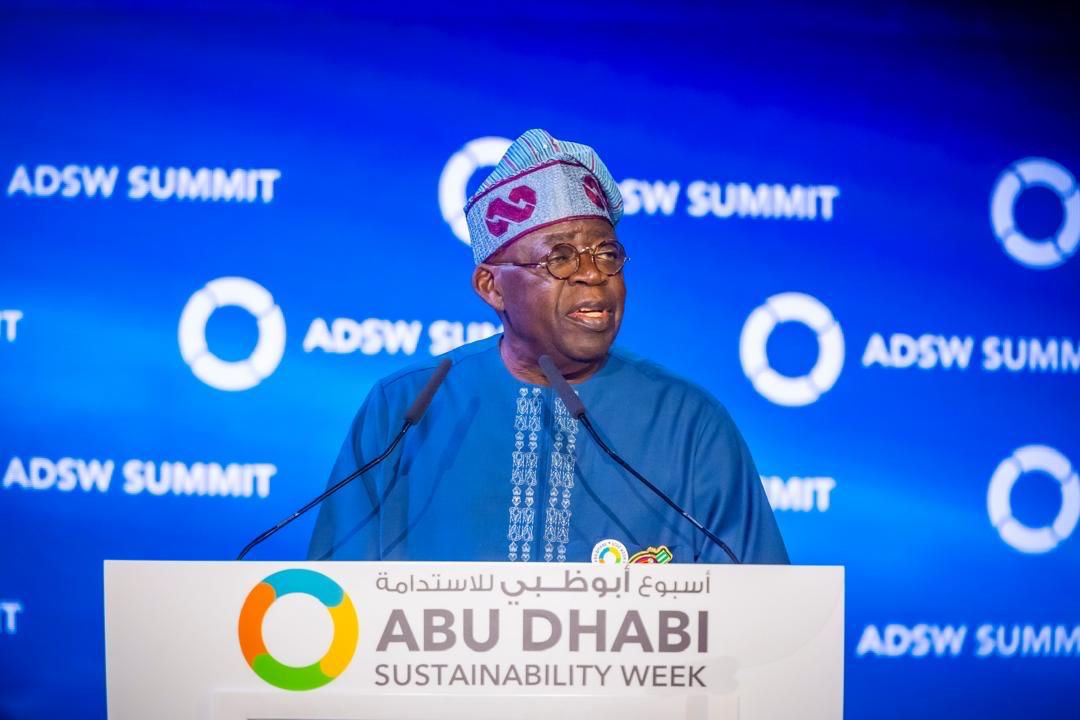Business
Nigeria Ready For The World To Do Business, Tinubu Assures

President Bola Ahmed Tinubu assured a global audience Wednesday in the United Arab Emirates that Nigeria is ready to work with other nations to build a resilient, equitable, and sustainable world for all.
President Tinubu spoke on the second day of the 2025 Abu Dhabi Sustainability Week on “From Climate Imperatives into Economic Prosperity: Bridging Africa with the Global Energy Future. ”
The president declared that no single nation can walk the road to sustainability alone, stressing that global interconnectedness demands collective action, knowledge sharing, and mutual support.
“The fight against climate change is not merely an environmental necessity but a global economic opportunity to reshape the trajectory of our continent and the global energy landscape.
“As leaders, stakeholders and citizens of our planet, we stand at a critical juncture in human history. To succeed, we must innovate, collaborate and act decisively as one global community,” he said.
Reiterating his administration’s commitment to reducing carbon emissions, President Tinubu assured the audience that the Nigerian government had developed actionable programmes in line with global expectations, bearing in mind Nigeria’s economic and political expectations.
“We have embraced a vision of sustainability that aligns with global aspirations while addressing local realities. Our efforts are anchored on three pillars: Energy Transition, Climate Resilience, and Sustainable Development. My administration recognises the importance of reducing carbon emissions and a just transition to clean and renewable energy, promoting environmental sustainability and economic growth.
“Our energy transition plans, like many nations, are aimed at diversifying energy sources and reducing dependency on fossil fuels, prioritising the transition to cleaner energy sources as a cornerstone of our national development strategy.”
He added that Nigeria is developing infrastructure for the widespread use of Compressed Natural Gas and electric vehicles and harnessing the potential in solid minerals to support the green energy transition.
The Nigerian leader stressed that his country is also implementing climate-smart agricultural practices to enhance food security and lessen its destructive environmental impact. These include the introduction of the National Clean Cooking Policy, which aims to promote clean energy, environmental and health benefits, and socio-economic development in the African region.
President Tinubu said the government is working with local communities to implement solutions to mitigate the adverse consequences of the country’s environmental challenges, such as deforestation, desertification, coastal erosion, flooding, and pollution.
These challenges, he said, threaten the livelihoods of millions.
He called on partner countries to collaborate in mobilising resources to tackle these challenges and embrace innovation and technology.
“To promote a Green Economy in Africa, we must focus on integrating sustainable practices in all sectors of our economy. These investments are capital intensive and require international support from partner countries, including multinational organisations, development partners and individuals who share our vision of a sustainable, prosperous and equitable future”, he said
According to the President, “Nigeria became the first country in Africa to initiate funding of green projects through Sovereign Green Bond proceeds, the third issuance of which is in progress. We urge investors to partner with us in this regard. Our administration remains committed to providing an enabling environment for businesses to thrive in Nigeria.
“By partnering with global leaders and harnessing the power of technology, we are finding new and innovative ways to address our environmental challenges. We have arable agricultural lands for advanced technological farming, including a bright future for Artificial Intelligence.”
President Tinubu commended the President of the United Arab Emirates, His Highness Sheikh Mohamed bin Zayed bin Sultan Al Nahyan, for his invitation and foresight in organising the event.
The event brought world leaders together to exchange views and perspectives on how to address the global challenges of our time collectively.

